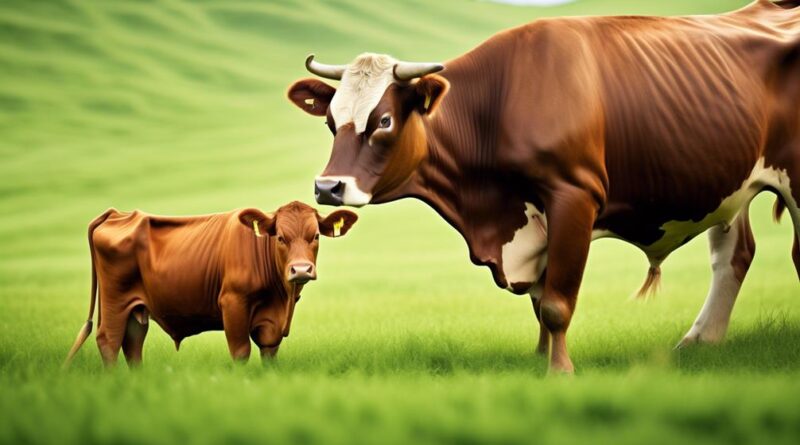5 Ways Nutrition Affects Cattle Reproductive Health
You probably think that what your cattle eat has nothing to do with their reproductive health, but you might be surprised to learn that nutrition plays a crucial role in their fertility. The quality and balance of their diet can significantly impact their ability to conceive and carry a pregnancy to term.
From nutrient deficiencies to energy intake, protein, minerals, and vitamins, there are several ways in which nutrition influences cattle reproductive health. Understanding these factors is vital for ensuring the success of your breeding program and the overall well-being of your herd.
Importance of Balanced Diet
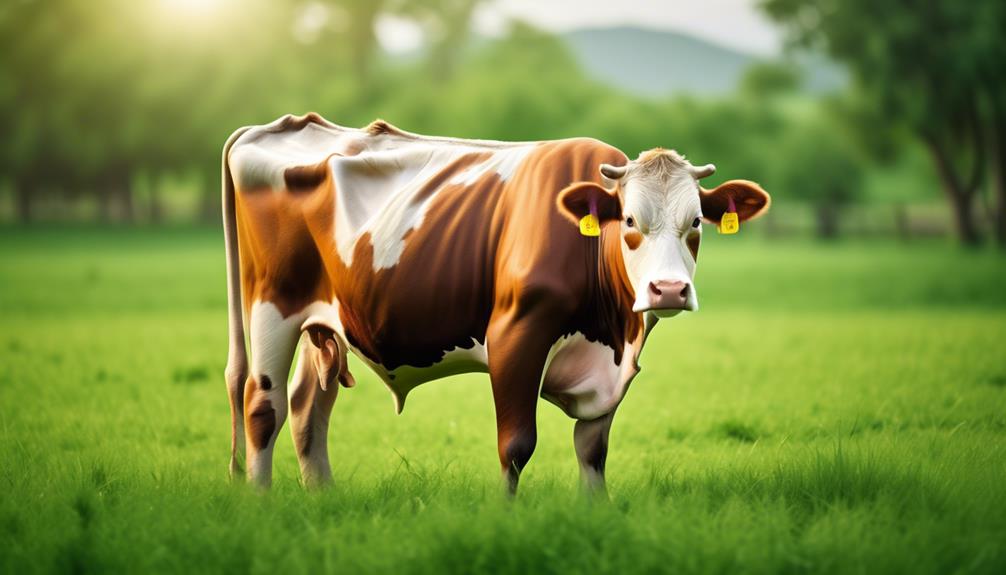
To maintain optimal reproductive health in cattle, it's crucial to ensure they consume a balanced diet rich in essential nutrients and vitamins. Diet quality plays a critical role in the reproductive performance of cattle. A well-balanced diet not only supports the overall health of the animal but also has a direct impact on their reproductive capabilities.
When it comes to reproductive performance, the quality of the diet can't be overstated. A balanced diet ensures that cattle receive the necessary nutrients to support their reproductive functions. For example, essential vitamins such as A, D, and E are vital for reproductive health. Additionally, minerals like calcium, phosphorus, and magnesium are crucial for maintaining proper physiological functions, including reproductive processes.
Furthermore, the impact of diet quality on reproductive performance extends to the overall fertility of the herd. A balanced diet can contribute to better conception rates, reduced instances of infertility, and improved calving intervals. Inadequate nutrition can lead to delayed puberty, irregular estrous cycles, and decreased conception rates.
Therefore, ensuring that cattle receive a balanced diet is essential for sustaining reproductive efficiency within the herd.
Nutrient Deficiencies and Fertility
Nutrient deficiencies can significantly impact cattle fertility, affecting their reproductive performance and overall herd productivity. When essential nutrients are lacking in a cattle's diet, it can lead to hormonal imbalances that interfere with their reproductive processes. This can be a source of frustration and concern for cattle farmers, as they witness the negative effects of nutrient deficiencies on their herd's ability to reproduce and thrive.
Consider the following emotional aspects:
- Frustration: It's disheartening to see your cattle struggle with fertility issues due to nutrient deficiencies. You might feel a sense of helplessness as you strive to provide the best care for your herd, only to be met with reproductive challenges caused by inadequate nutrition.
- *Example*: Picture the frustration of observing your cows experiencing difficulty in conceiving or maintaining pregnancies due to nutrient deficiencies. It's a distressing situation that impacts not only the cattle but also the livelihood of the farm.
- Concern for Livelihood: The impact of nutrient deficiencies on reproductive performance can cause significant concern for the livelihood of cattle farmers. The ability to sustain a productive and healthy herd is essential for the success of any cattle operation.
- *Example*: Imagine the worry and stress that arises when nutrient deficiencies lead to decreased reproductive rates, jeopardizing the future productivity and sustainability of your cattle farm.
These emotional considerations underscore the critical importance of addressing and preventing nutrient deficiencies to maintain optimal reproductive health and performance in cattle.
Impact of Energy Intake
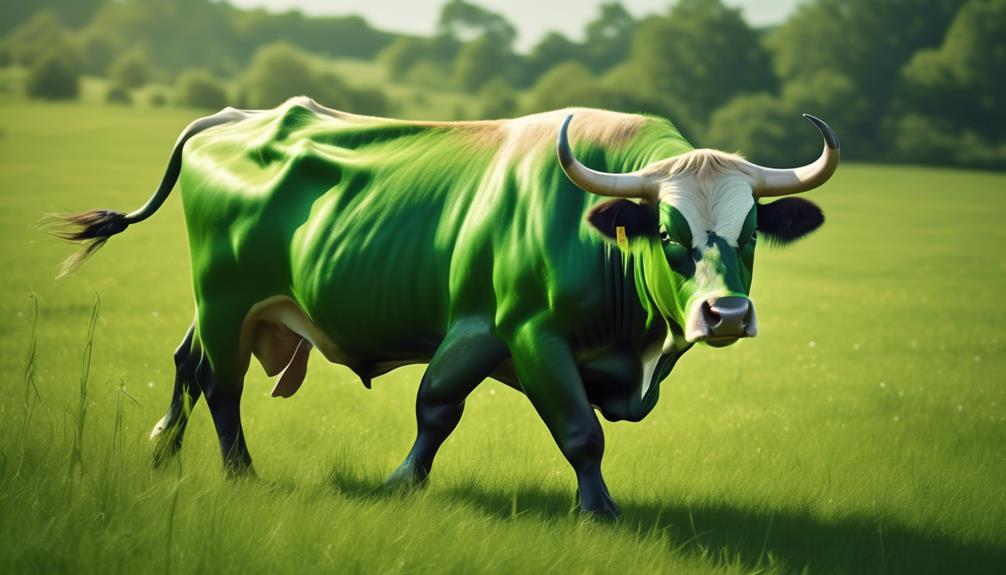
Considering the significant role of energy intake in cattle reproductive health, it directly influences their overall fertility and breeding success. Energy balance plays a crucial role in determining reproductive performance in cattle. Adequate energy intake is essential to support the metabolic demands associated with reproduction, including estrus expression, ovulation, embryonic development, and successful pregnancy establishment.
Maintaining an optimal energy balance is vital for ensuring cattle reproductive success. When cattle experience a negative energy balance, meaning they're expending more energy than they're consuming, it can have detrimental effects on their reproductive performance. Inadequate energy intake can lead to disruptions in the estrous cycle, decreased conception rates, and increased embryonic mortality. On the other hand, excessive energy intake can also negatively impact reproductive performance, leading to conditions such as anestrus and reduced fertility.
Balancing energy intake with the specific reproductive needs of cattle is essential for maximizing breeding success. Providing a nutritionally balanced diet that meets the energy requirements of cattle at different stages of reproduction is key to ensuring optimal reproductive performance. Additionally, monitoring body condition score can help assess energy balance and make necessary adjustments to the diet to support reproductive health.
Protein's Role in Reproduction
Achieving optimal reproductive performance in cattle requires not only maintaining an optimal energy balance, but also ensuring that protein intake meets their specific reproductive needs. Protein plays a crucial role in cattle reproduction, influencing processes such as protein synthesis and hormone regulation, which are essential for successful reproduction.
Here's how protein directly impacts cattle reproductive health:
- Nutritional Importance: Adequate protein intake is vital for the production of hormones essential for heat detection, ovulation, and embryo implantation. Without the right levels of protein, these processes can be disrupted, leading to reduced fertility and conception rates. It's crucial to ensure that your cattle's diet includes sufficient high-quality protein sources to support these reproductive functions.
- Health and Well-being: Protein isn't only necessary for reproductive processes but also plays a significant role in overall health and well-being. Cattle with insufficient protein intake may experience weakened immune systems and decreased energy levels, negatively impacting their reproductive performance. Ensuring that your cattle receive the right amount of protein won't only benefit their reproductive health but also contribute to their overall vitality and productivity.
The Influence of Minerals
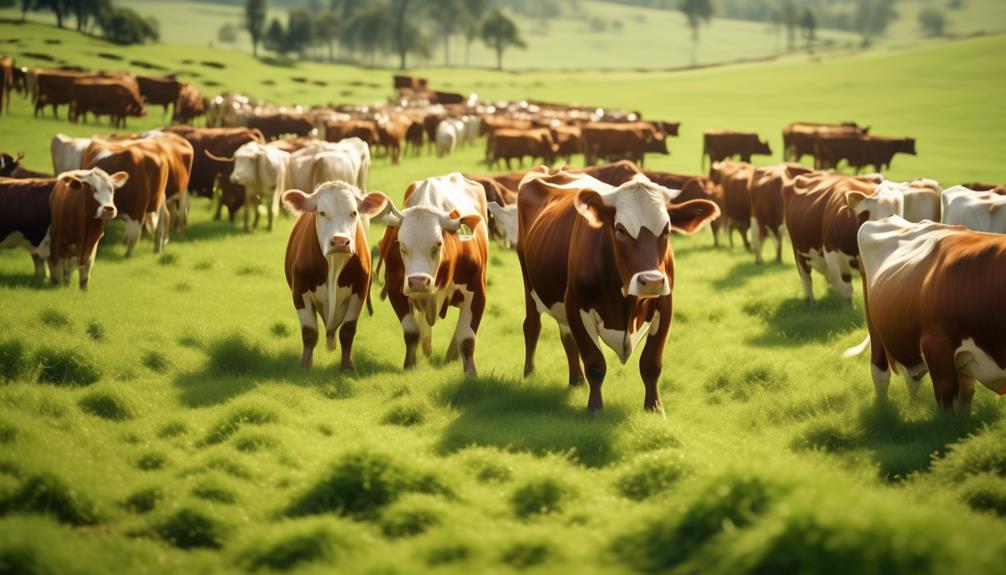
Mineral supplementation is crucial for maintaining cattle fertility and reproductive performance. Minerals such as copper, zinc, selenium, and manganese are essential for various reproductive processes in cattle. Copper is involved in the synthesis of enzymes that are crucial for reproductive function, while zinc plays a key role in the development of healthy ova and sperm. Selenium is important for preventing oxidative damage to reproductive tissues, and manganese is involved in the synthesis of reproductive hormones.
However, mineral imbalances can have detrimental effects on cattle fertility. Excessive levels of certain minerals, such as copper, can be toxic and impair reproductive performance. Conversely, deficiencies in essential minerals can lead to decreased fertility, lower conception rates, and an increased risk of embryonic loss.
Therefore, it's important to provide appropriate mineral supplementation to ensure that cattle have access to the necessary nutrients for optimal reproductive health.
Vitamins and Reproductive Function
Vitamins play a vital role in supporting optimal reproductive function in cattle, influencing various processes essential for fertility and conception. Hormone regulation is crucial for reproductive health, and vitamin supplementation can significantly impact this process. For instance, vitamin E and selenium are essential for the synthesis and metabolism of thyroid hormones, which in turn regulate the reproductive hormones in cattle. Ensuring adequate levels of these vitamins can help maintain proper hormone balance, supporting regular estrous cycles and optimal ovulation.
When it comes to fetal development, vitamin levels are equally crucial. Adequate vitamin A, for example, is essential for the proper development of the fetal organs and immune system. Low levels of vitamin A can lead to embryonic death and an increased risk of fetal abnormalities, which can be emotionally distressing for cattle breeders. Similarly, vitamin D plays a critical role in calcium and phosphorus metabolism, which are vital for skeletal development in the fetus. Insufficient levels of vitamin D can result in weak, deformed, or stillborn calves, causing significant emotional and financial distress for cattle producers.
Ensuring proper vitamin levels through a balanced diet or supplementation is thus crucial for maintaining optimal reproductive function and supporting healthy fetal development in cattle. By paying attention to these essential nutrients, cattle breeders can help minimize the emotional toll of reproductive issues and ensure the overall well-being of their herds.
Effects of Poor Body Condition
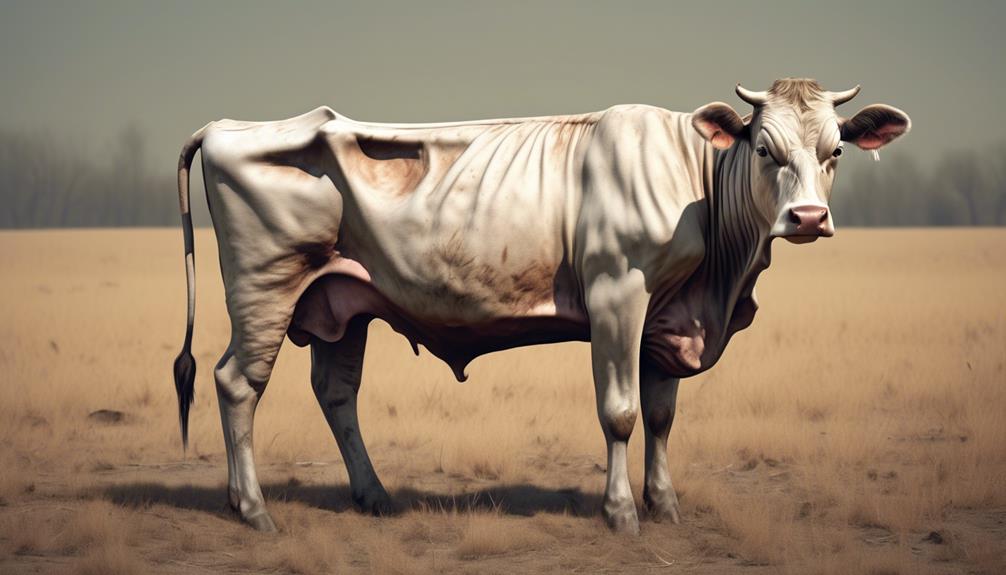
The nutritional status of your cattle can have significant repercussions on their reproductive health, impacting fertility and conception as well as the development of the fetus. When your cattle are in poor body condition, it can lead to detrimental effects on their reproductive performance. Body condition scoring is a crucial tool for assessing the nutritional status of your cattle and plays a significant role in their reproductive health.
Poor body condition in cattle can result in decreased reproductive performance. Cattle that are undernourished or in poor body condition may experience irregular estrous cycles, leading to reduced fertility and conception rates. Additionally, cows in poor body condition may have difficulty maintaining pregnancy, which can lead to higher rates of embryonic loss and early pregnancy failure. This can ultimately impact the overall productivity of your herd.
Furthermore, poor body condition can also affect the development of the fetus. Undernourished cows may give birth to weaker calves with lower birth weights, impacting the overall health and vigor of the offspring. These calves may also be more susceptible to diseases and have a higher mortality rate.
Managing Nutrition for Breeding Cattle
To ensure optimal reproductive health in your breeding cattle, it's essential to carefully manage their nutrition throughout the breeding cycle. Proper feeding strategies play a crucial role in enhancing the reproductive performance of your cattle. Here are some key points to consider:
- Feeding Strategies:
- Balanced Diet: Providing a well-balanced diet rich in essential nutrients such as protein, energy, vitamins, and minerals is vital for the overall reproductive health of your breeding cattle. A balanced diet supports optimal body condition, which is essential for successful breeding and conception.
- Nutritional Supplements: Incorporating nutritional supplements, such as mineral blocks or vitamin-enriched feeds, can help address any deficiencies in your cattle's diet. These supplements can contribute to improved reproductive performance and overall health, ensuring that your breeding cattle are in prime condition for successful breeding.
Effective management of your cattle's nutrition is imperative for maximizing their reproductive potential. By implementing suitable feeding strategies and ensuring that your cattle receive the necessary nutrients, you can significantly impact their reproductive performance.
It's essential to monitor their body condition and adjust their diet as needed to support their reproductive health. Proper nutrition not only enhances the breeding success of your cattle but also contributes to the overall well-being of your herd.
Frequently Asked Questions
Can a Cow's Reproductive Health Be Affected by the Type of Grass or Forage It Consumes?
Yes, the type of grass or forage you feed your cattle can significantly impact their reproductive health. By carefully selecting forages rich in essential nutrients, you can optimize fertility and ensure the overall reproductive well-being of your herd.
How Does the Season or Climate Affect the Nutritional Needs of Breeding Cattle?
In seasonal variations, the climate impacts the nutritional requirements of breeding cattle. Understanding these changes is crucial for maintaining their reproductive health. Adjusting their diet according to changing seasons is essential for optimal breeding success.
Are There Specific Vitamins or Minerals That Are Essential for Optimizing Fertility in Cattle?
You need to ensure that your cattle meet their vitamin requirements for optimal fertility. Consider mineral supplementation as well to support their reproductive health. These are essential factors for maximizing cattle fertility.
What Role Does Water Intake Play in the Reproductive Health of Cattle?
Drinking adequate water intake is crucial for cattle reproductive health. It helps regulate reproductive hormones, leading to better breeding success. It also impacts forage quality, which is essential for fertility optimization. Ensure proper hydration for optimal reproductive performance.
How Does the Nutritional Status of the Bull Impact the Reproductive Success of the Herd?
To improve breeding performance and reproductive health, ensure the bull's nutritional requirements are met. Quality grass contributes to their overall health, impacting the success of the herd. It's crucial to prioritize their nutrition for optimal reproductive outcomes.
Conclusion
So, remember to prioritize a balanced diet for your cattle to ensure their reproductive health.
Nutrient deficiencies, energy intake, protein, minerals, and vitamins all play crucial roles in their reproductive function.
Don't overlook the effects of poor body condition on fertility.
By managing their nutrition carefully, you can help your breeding cattle stay healthy and improve their chances of successful reproduction.
